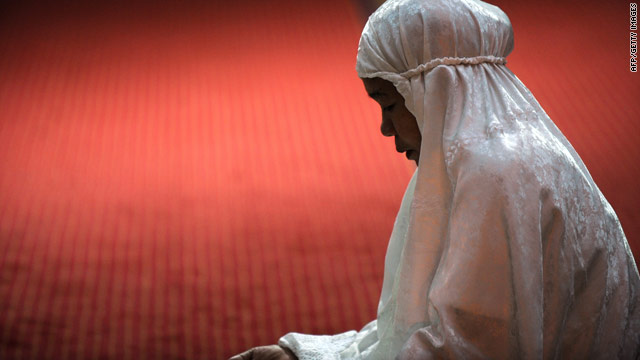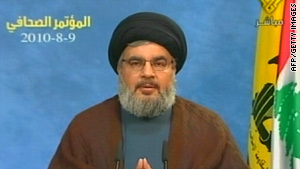|

|
August 21, 2010
Posted: 2003 GMT
After months of tense relations with Israel's right-wing coalition government led by Prime Minister Benjamin Netanyahu and a great deal of pressure being placed on President Mahmoud Abbas and his Palestinian Authority, the Obama administration marked one of its first Middle East diplomatic successes this past week with the announcement that Israeli and Palestinians would resume direct negotiations starting in September in Washington. Expectations, however, are not high and the one-year time frame for the talks to achieve a workable agreement is considered overly optimistic by some. But despite the doubts, getting the two sides speaking again is being heralded by the American government as an important first step. Our Jerusalem correspondent explains here what exactly is at stake in these talks. Filed under: General •Israel •Jerusalem •Palestinians
August 20, 2010
Posted: 2012 GMT
CNN's Cal Perry reports on the Lebanese government's version of events the day of the deadly border clash between Lebanon's armed forces and the Israeli military earlier this month. The government says 10 soldiers were dispatched to the border area when word was received that the Israeli military was doing some sort of work in the area. Their mission – "to protect its sovereign borders from any Israeli infringement." Read the rest of the story here. Filed under: General •Israel •Lebanon
August 19, 2010
Posted: 2131 GMT
Our Beirut producer Nada Husseini reports that activists in Lebanon are planning the launch of another Gaza bound flotilla. Speaking with media Thursday from the coastal city of Tripoli, flotilla organizer Samar al Hajj said dozens of female activists from Europe, Egypt, Bahrain and India, will set sail carrying cancer medication for women and children in addition to diapers, books, and toys. The activists are planning on departing Lebanon Sunday on the Safinat Mariam, a boat named after the Virgin Mary. Expected to join the Mariam is another vessel sponsored by the Free Gaza Movement and a group called Journalists without Borders. Al Hajj said the ships would make their way on a ten-hour journey to Larnaca in Cyrpus first where they hope to proceed to Gaza. Al Sajj said they have permission from the Lebanese authorities to travel to Cyprus, but have not received authorization from Cypriot officials to sail on to Gaza. Activist organized flotillas to break through Israel’s naval blockade of the Gaza Strip have presented a major challenge to the Jewish state. In May activists attempting to run the blockade were stopped by Israeli commandos as part of the government’s stated attempt to thwart weapons smuggling to Gaza militants intent on attacking the Jewish state. Commandos who boarded one of the ships, a Turkish-flagged vessel called the Mavi Marmara, fought with activists. The confrontation left one Turkish-American and eight Turkish activists dead, and sparked an international outcry. And in other flotilla related news the Israeli military acknowledged today that it is investigating claims that some of its soldiers stole personal belongings of activists participating in the controversial Gaza aid flotilla in May. Filed under: Gaza •General •Israel •Lebanon
August 18, 2010
Posted: 2003 GMT
The Lebanese Parliament’s passage of legislation amending its labor and social security rules for over 400,000 Palestinian refugees living in the country has been met with varying reactions in the region. The new legislation which is expected to be signed into law within the next month makes it easier for Palestinian refugees to work legally in Lebanon and opens up jobs previously closed to them. In a statement released Wednesday, the United Nations Relief and Works Agency, the organization charged with administering to Palestinian refugees, called the move a “an important step in the right direction” and in a letter to his Lebanese counterpart Palestinian Authority Labor Minister Ahmad Majdalani applauded the move but called on the Lebanese to do more to improve the quality of life for Palestinian refugees during their “temporary” stay in Lebanon. An editorial in Lebanon’s Daily Star newspaper also welcomed the decision and played down fears it was the first step towards naturalizing Palestinian refugees, a move many fear would upset the delicate religious balance in Lebanon’s government. But some critics have said the new law does not go nearly far enough. The leftist Democratic Front for the Liberation of Palestine called the decision “a beautification of the deprivation policy by the Lebanese state” and called on the government to grant full civil rights to Palestinian refugees. Palestinians in Lebanon make up about 10% of the country’s population and half of those registered Palestinians live in one of 12 refugee camps scattered throughout the country. Palestinians in Lebanon have been denied a number of basic rights enjoyed by Lebanese citizens and other foreign nationals. In 2001 Palestinians were banned from owning property and Lebanese law has long prohibited them from working in certain professions including the law, medicine, and engineering. Filed under: General •Lebanon •Palestinians
August 17, 2010
Posted: 1346 GMT
Last week CNN reported on an incredible numismatic find in Israel. Archaeologists digging in an Hellenistic building site found a 2,200-year-old gold coin embedded in a wall. The coin weighed in at a whopping 27 grams (most ancient coins weigh a mere 4 .5 grams) and it was minted in Alexandria, Egypt, by Ptolemy V and dates to 191 BCE. It is only the second gold Ptolemaic coin ever found in Israel. CNN Jerusalem producer Mike Schwartz caught up with the head of the coin department at the Israeli Antiquities Authority who showed us the ancient money. Filed under: Archaeology •Israel •Video
August 13, 2010
Posted: 533 GMT
Click here to submit photos and video CNN is planning a four-week series on modern Islam that will run daily throughout the month of Ramadan, and we want you to get involved. The series will look at what it means to be Muslim and how people live as Muslims in 2010. CNN invites you to grab your camera and show us how you are embracing your faith. Show and tell us what it means to be Muslim today. Show us how Ramadan is observed where you live. Show us your life during Ramadan, including special customs or traditions. Your story can be told through photos or video. The best images and stories will appear on air or online as part of CNN's global coverage.
August 10, 2010
Posted: 1932 GMT
 A Muslim women in Indonesia praying as Ramadan starts. We want to know what it means to you to be a Muslim. If you are a practicing Muslim you are probably getting ready for the start of Ramadan. As well as preparing for the month of fasting, prayer and time shared with loved ones, perhaps you are thinking about what your religion means to you. Maybe you are contemplating how you balance your faith with the demands of the rapidly changing, increasingly globalized world. Or perhaps you are thinking about how Islam is perceived by those from other faiths. If you are young, maybe you are wondering what the future will hold for you as a Muslim. If you are older, are you thinking about how society is changing and the pressures these changes are putting on your faith? Over the next four weeks, CNN International’s “Muslim in 2010” coverage will cross the planet looking at modern Islam asking questions just like these. We will look at what it means to be Muslim and how people live as Muslims in the 21st century. Reporting from Cairo to Kuala Lumpur and Istanbul to Abu Dhabi, we’ll be capturing the debates and the issues and talking to Muslims who are embracing their faith in 2010. We also want you to get involved: Grab your camera and show us how you are embracing your faith. Show and tell us what it means to be a Muslim today. Let us see how Ramadan is observed where you live and your life during Ramadan, including special customs or traditions. Tell us by submitting either photos or video to CNN iReport and you could be featured on CNN. Posted by: cnn inside the middle east digital producer, Mairi Mackay Posted: 926 GMT
By the CNN Wire Staff Beirut, Lebanon (CNN) - Hezbollah leader Hassan Nasrallah accused Israel on Monday of having been behind the 2005 killing of former Lebanese Prime Minister Rafik Hariri. 
"We accuse the Israeli enemy of this assassination," said Nasrallah, who spoke with reporters in Beirut via a video link from an undisclosed location. "Israel has the capabilities to execute this type of assassinations and similar attacks. They are well-known in this field and, indeed, have the expertise in targeting Palestinian and Lebanese figures, here and abroad. "Lebanon offers Israel a fertile soil with the spies that they have on our land, and this is how Israel was plotting from the beginning to accuse Hezbollah of the assassination of Hariri." There was no immediate reaction from the Israelis. Hariri was assassinated February 14, 2005, when a bomb erupted near his motorcade in Beirut. A U.N.-sponsored investigation is under way. Last month, Nasrallah said Hariri's son, current Prime Minister Saad Hariri, had told him that the special tribunal would implicate rogue Hezbollah members for the killing but not the party itself. Nasrallah said he would reject any such conclusion. "We absolutely reject accusing any Hezbollah member of the killing of Hariri," the Hezbollah leader said. "We will not accept any indictment to anyone in Hezbollah." Read full story Filed under: General •Hezbollah •Israel •Lebanon
August 8, 2010
Posted: 1249 GMT
From Inside the Middle East's August show. Read full story and view video here... From Tracey Holmes, CNN Dubai, United Arab Emirates (CNN) - Pearl diving is now a rarity in the UAE, but dhows, the boats traditionally used for pearling, are making a comeback as the racing boat of choice for a generation of younger Emiratis.
Before oil was discovered in the region, locals made their living as pearl divers. The men would go to sea for months at a time and, while it sounds romantic, life was tough. Today, pearl diving has almost disappeared, but young Emiratis are rediscovering dhows - not for pearling, but for racing. Dubai International Marine Club (DIMC) has been organizing dhow races since 1991. But who wins and loses isn't as important as keeping tradition alive. DIMC managing director Saeed Harib told CNN: "They receive good prize money. They receive some money from the owners, but in the end they are maintaining our heritage." Posted by: IME Producer
August 3, 2010
Posted: 1036 GMT
|
This blog has now been archived and commenting has been switched off. Visit the Inside the Middle East site for news, views and video from across the region. Read more about CNN's special reports policy Categories
Archive
|